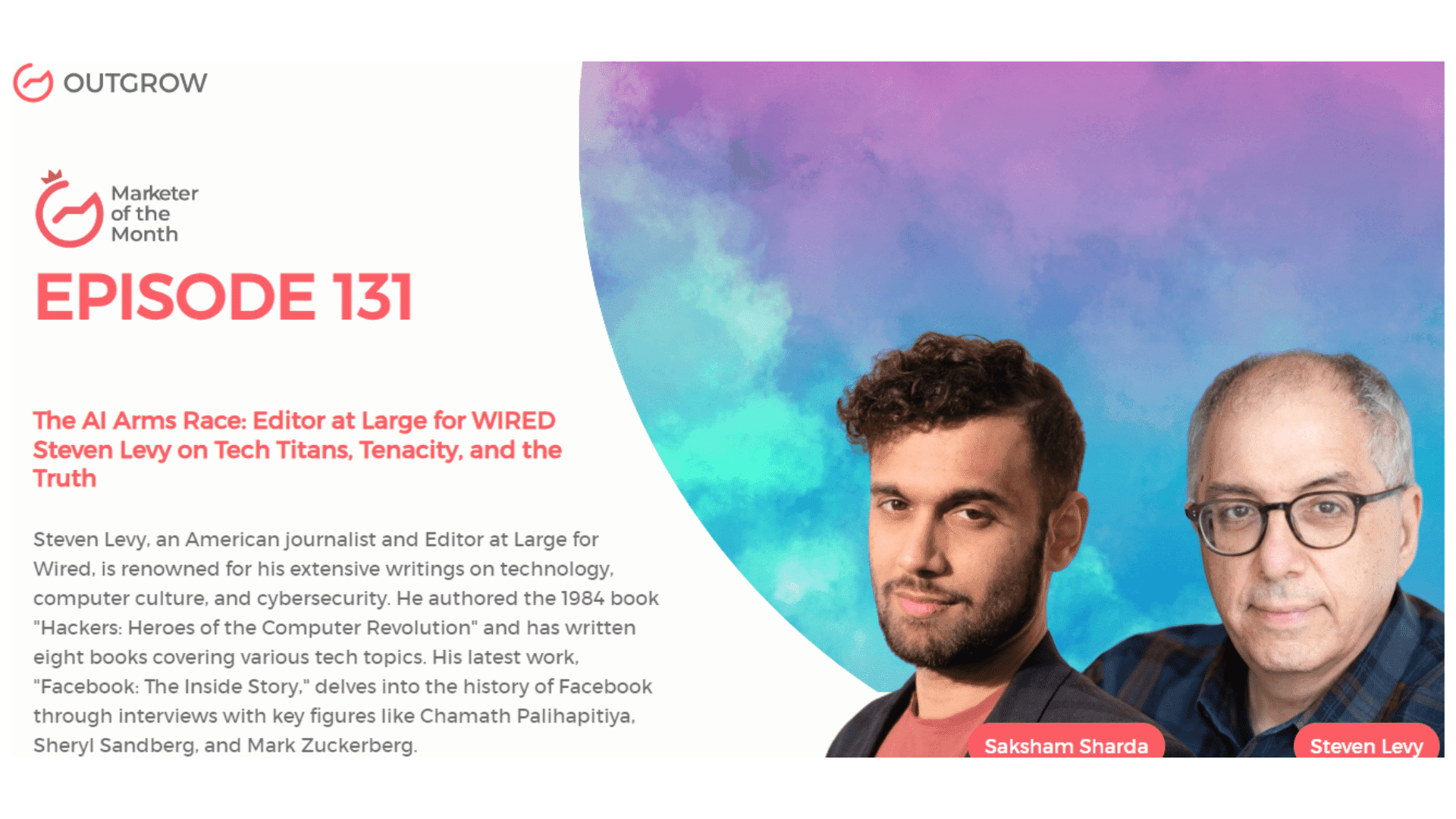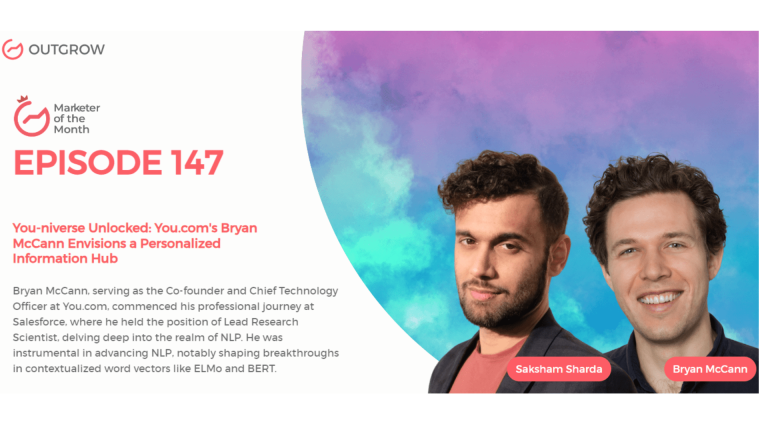Summarize with :
EPISODE 131: Marketer of the Month Podcast with Steven Levy
Table of Contents
Hey there! Welcome to the Marketer Of The Month blog!
We recently interviewed Steven Levy for our monthly podcast – ‘Marketer of the Month’! We had some amazing insightful conversations with Steven and here’s what we discussed about-
1. AI’s Resemblance to the Early Internet Boom.
2. The AI Arms Race Among Tech Giants.
3. Facebook’s Growth-Centric Culture & Competition with Emerging Platforms.
4. The Challenge of Privacy and Security in the Digital Age.
5. Balancing Fair Reporting on Major Tech Companies.
6. Thriving in the Ongoing Digital Revolution.
About our host:
Dr. Saksham Sharda is the Chief Information Officer at Outgrow.co. He specializes in data collection, analysis, filtering, and transfer by means of widgets and applets. Interactive, cultural, and trending widgets designed by him have been featured on TrendHunter, Alibaba, ProductHunt, New York Marketing Association, FactoryBerlin, Digimarcon Silicon Valley, and at The European Affiliate Summit.
About our guest:
Steven Levy, an American journalist and Editor at Large for Wired, is renowned for his extensive writings on technology, computer culture, and cybersecurity. He authored the 1984 book “Hackers: Heroes of the Computer Revolution” and has written eight books covering various tech topics. His latest work, “Facebook: The Inside Story,” delves into the history of Facebook through interviews with key figures like Chamath Palihapitiya, Sheryl Sandberg, and Mark Zuckerberg.
The AI Arms Race: Editor at Large for WIRED Steven Levy on Tech Titans, Tenacity, and the Truth
The Intro!
Saksham Sharda: Hi, everyone. Welcome to another episode of Outgrow’s Marketer of the Month. I’m your host, Dr. Saksham Sharda, and I’m the creative director at Outgrow. co. And for this month we are going to interview Steven Levy, who is an American journalist and Editor at Large for Wired.
Steven Levy: Great to be here. Thank you.
Don’t have time to read? No problem, just watch the Podcast!
Or you can just listen to it on Spotify!
The Rapid Fire Round!
Saksham Sharda: Alright, so let’s start with the Rapid Fire round. The first one is, at what age do you want to retire?
Steven Levy: I am 72 now, and I don’t think I want to retire anytime soon.
Saksham Sharda: How long does it take you to get ready in the morning?
Steven Levy: I take a while to catch up on the news before I even get out of bed. So I would say I’m at least an hour before I’m ready to face the deck.
Saksham Sharda: Most embarrassing moment of your life?
Steven Levy: Probably I’m having the most embarrassing moment in my life right now.
Saksham Sharda: Favorite color?
Steven Levy: I don’t have a favorite color.
Saksham Sharda: What time of day are you most inspired?
Steven Levy: Inspiration comes to me around mid-afternoon.
Saksham Sharda: How many hours of sleep can you survive on?
Steven Levy: I usually get by between five and six hours of sleep. But I appreciate six.
Saksham Sharda: Fill in the blank. And the upcoming journalism trend is _____.
Steven Levy: An upcoming journalism trend is trying to prove you’re not an AI.
Saksham Sharda: The city in which the best kiss of your life happened?
Steven Levy: Pass.
Saksham Sharda: Pick one Mark Zuckerberg or Elon Musk.
Steven Levy: Mark Zuckerberg.
Saksham Sharda: The biggest mistake of your career?
Steven Levy: The biggest mistake of my career was not starting it soon.
Saksham Sharda: How do you relax?
Steven Levy: I relax by reading the genre of fiction.
Saksham Sharda: How many cups of coffee do you drink per day?
Steven Levy: I just recently cut back from three cups of coffee to one.
Saksham Sharda: A habit of yours that you hate?
Steven Levy: I have a habit I probably hate. I look at my phone too much.
Saksham Sharda: The most valuable skill you’ve learned in life?
Steven Levy: The most valuable skill I’ve learned in life is getting compliments.
Saksham Sharda: Your favorite Netflix show?
Steven Levy: I love The Diplomat on Netflix.
Saksham Sharda: The last song you’ve been listening to?
Steven Levy: The Performance Song by Mick Jagger, the Ry Cooder playing slide guitar.
Saksham Sharda: And the last movie that had a good impression on you?
Steven Levy: I thought that Air was a great movie.
The Big Questions!
Saksham Sharda: So, the first question is, given your expertise in covering major tech companies, what emerging trends or developments do you think will have the biggest impact on our digital society in the next decade?
Steven Levy: In assessing what technology is having the biggest impact, it’s not even close. AI is now the story in technology because it’s the one that’s going to affect every human on earth whether they are actively great with it or not and we don’t know where it’s going, but it’s gonna change things.
Saksham Sharda: And do you think there’s gonna be AI fatigue at some point, or is it an overhyped trend, or what’s gonna happen with it?
Steven Levy: When I covered the internet in 1994-1995, it was very hard to overestimate the impact that the internet would have. No matter what we said about it turned out to be insufficient in terms of you know the changes it would make. I feel the same way about AI. People might get fatigued with AI, but the progress is not gonna stop and it’s going to continue to be a vital issue.
Saksham Sharda: Having seen the internet boom happen, how would you compare it to the AI one in what ways?
Steven Levy: I think like the internet boom it touched everything. So I think that’s comparable to AI. What is not comparable is the intimate nature of AI and its ability to do what we do. The internet never really pretended to be human beings or never presented itself as an intelligence in itself. So there are unique challenges to AI that we didn’t see with the internet.
Saksham Sharda: How has the introduction of AI tools like Chat GPT and Microsoft Bing affected Google’s monopoly in the search engine market?
Steven Levy: Google cut it back because even though Google’s technology was as good as anyone else’s when it came to AI and large language models they were commendable cautious on how they rolled it out and when Microsoft integrated open AI into their technology and particularly the research engine Google felt it couldn’t sit all the technology anymore and started rushing things out. So like it or not, we’re in an AI arms race.
Saksham Sharda: So what are the primary reasons behind this sudden craze surrounding these alternative AI tools?
Steven Levy: The abrasive AI isn’t because it’s an interesting toy, it’s because you could do things with it you got to be careful, you got to check your facts. And if you’re a commercial publication, you might check your copyright issue before you use an image from Dolly or The Journey or something. But what distinguishes it makes it vital now is that you could put it to use now.
Saksham Sharda: So, as the author of Facebook, the Inside Story what insights can you share about the culture and impact of the social media giant?
Steven Levy: The thing about Facebook to remember is how integral growth was to everything it did. From the very start, Mark Zuckerberg was figuring out how to grow it more, and his vision was to have everyone on the planet use products or products now. And, you know, to fill in what he referred to as the social graph, as it went on, he went beyond that because every trend that every other company did, he wanted to integrate that into what he did. But the North Star was always growing to get more people. And then once you get more people, to get them to do more things when it’s a platform.
Saksham Sharda: So in light of the growing competition from platforms like Twitter and others, what do you think of Facebook’s current position in the market compared to TikTok, Twitter, and all the others?
Steven Levy: I think Facebook has some challenges in it plateaued in some of its core functions and it did very well in appropriating stories from snap. That’s a big driver of its attention and revenue now. And I think with reels it has a chance to be successful particularly if TikTok gets banned in the US.
Saksham Sharda: So, as someone who’s witnessed the evolution of the internet and its impact on society, what are your thoughts on the challenges of maintaining privacy and security in the digital age?
Steven Levy: It’s a continuing challenge to keep privacy safe in a digital age. The digital age was not built to keep our privacy and most of the things we’re doing now to address this are sort of blocking abilities the technology has natively. In the long run, that’s not gonna work and in terms of safety, we have never been able to come up with a truly effective way to make things safe. So, I don’t have a rosy forecast for either of those areas.
Saksham Sharda: So, how can we address these challenges to create a safer digital environment?
Steven Levy: Well, yeah I mean the challenge in privacy is we have unlimited ability to capture data, store data, and implement data. And it’s very difficult to restrain those abilities once they’re rolled out. Face recognition is relatively simple to do now and passing a law against it will stop it among some companies that follow the law. But there are other places and governments that are going to implement it in a widespread fashion. And if there is a security panic like what happened after nine eleven occurs then we’re gonna see that slide back. So in New York City now you have to show an ID before you go into any big commercial building and I predict in a few years you won’t have to show ID because they’ll have your face available to them and they’ll be able to check who you are without you even slowing down.
Saksham Sharda: How do Apple’s Vision Pro headset and Meta’s focus on the Metaverse reflect different visions of the future of computing and immersive experiences?
Steven Levy: So Meta has been pursuing mixed reality for years and Apple just made their announcement they’re somewhat competitive but have different visions of it. The DNA of meta is based on gaming and what Mark Zuckerberg has always said, the future is a social interaction. whereas Apple sees its Vision Pro and its spatial computing as an extension of the advances in inflection points in computer interfaces that we’ve seen over the last half a century from the graphical user interface to the mobile interface and because you have Dutch technology and you know they say you know their way of controlling it by your hand motions and eye motions as on an artificial canvas as part of that. And it’s more of a workplace thing and an individual activity than something for gaming or socializing. So there are two different visions, but the technology is the same: the technology dream they’re chasing, the challenges they’re gonna have, and the breakthroughs that have to be made are the same.
Saksham Sharda: So, do you feel that there is a chance that the breakthroughs or these developments would collapse like Google Glass did? Because people don’t like wearing stuff?
Steven Levy: It’s an open question about whether people wanna spend much of their time in a digital environment the question becomes easy when you’re asked to wear a headset that is uncomfortable in the long term but when you get something that’s lightweight, there still is a question about whether people are going to want to make that immersive experience or semi-immersive experience their everyday reality. I think they’re gonna say they don’t want it, but the experience and the value they get from having it is considerable. I think they’re gonna put their qualms aside just like we put our qualms aside about staring at an iPhone screen all the time and adopting it if the technology is good enough and lightweight enough and not intrusive enough.
Saksham Sharda: So, having written extensively about major tech companies like Google and Facebook, how do you navigate the challenge of balancing objective reporting while uncovering the intricacies of these powerful entities?
Steven Levy: I think I’ve managed pretty well to be fair to the companies I’m writing about and able to maintain ongoing relationships while being critical of the technology. I’m not afraid to say something is good when it’s good. Some reporters feel that giving up something is tough even if you think something is good. So, if the iPod is great, I’m gonna say the iPod’s great, but you also have to be able to call out when the technology is not good, when there are mistakes made, when things are done to benefit the company more than the user. So I feel if you’re able to fairly call out what’s good and what’s bad you’re gonna be good to your reader, good to yourself, and good to your subjects.
Saksham Sharda: So, what are the ethical considerations in this kind of reporting and how do you address the complexities of potential biases associated with such coverage?
Steven Levy: Well, you’re not gonna want these companies you write about to subsidize you or in any way like pay for your work and you have to call things out when you, even if you have someone in tech the world with a long relationship. You’re not going to jeopardize that relationship with a tweet that can necessarily be snarky about them. And then they say like hey, what’d you do that for? Well, when you’re writing a story your first responsibility is to your reader. And by and large the major figures in tech understand that it’s only the bottom feeders who will hold a grudge against you for calling people out when you’re fairly calling them out.
Saksham Sharda: So, in your public speaking engagements, what key messages or insights do you hope to convey about the digital revolution and the culture of high tech?
Steven Levy: When I speak in public, I try to make it get across that we’re only at the beginning of this revolution, even though it’s been going on for almost half a century. Since the microchipt only has a one-story building on the others, the big acts are still to come and there’s still time to get in on the ground floor as it were, and pursue this. And, if you have an open mind you’re living, you realize you’re living in a thrilling, exciting time with a lot of pearls but also, a time that’s all maybe unique in human history. So, it’s great to participate in that.
Saksham Sharda: So what are some of the most impactful anecdotes or stories you shared to convey the key message of this digital revolution or the insights about it?
Steven Levy: When I was just starting in the early eighties and writing about this, I always felt bad. I said if I started a few years earlier, I could have gone to Apple Computer when they were beginning. That would’ve been a great story to write about the garage at Apple and maybe coming out with the Apple too, and getting on the ground floor. And I was like whining about this one day to Stewart Brand the great founder of the Whole Earth Catalog. And he said to me Steven, what are you talking about? One day people will be coming to you and saying, what was it like with you we’re starting to write about the personal computer industry and Apple and the Macintosh in 1984, and he was utterly right. So now even though I felt I started a little late, people are asking me about what it was like back then in the 1980s, in the 1990s when the internet was getting underway. And I believe the people who jump in and maybe started writing about AI this year, sometime 30, 40 years from now, people are gonna say, wow, what was it like to write about AI in 2023?
Saksham Sharda: That’s so true. So the last question for you is of a personal kind. What would you be doing in your life, if not this?
Steven Levy: I think I am so lucky to be doing this because anything else I’d be doing in my life would not be as interesting. When I was a kid, I thought I maybe couldn’t make a living as a writer and I would be an academic. I went to grad school and got a master’s, but decided that wasn’t for me. So if I had followed that course there were worse things to be but I would be nowhere as happy as I am now whether like an academic or a lawyer or anything else. So I’m happy that I’m doing this because I can’t do anything else as well.
Let’s Conclude!
Saksham Sharda: Thanks, everyone for joining us for this month’s episode of Outgrow’s Marketer of the Month. That was Steven Levy, who is an American journalist and Editor at Large for Wired.
Steven Levy: Pleasure. Thanks for having me.
Saksham Sharda: Check out the website for more details and we’ll see you once again next month with another marketer of the month.

Muskan is a Marketing Analyst at Outgrow. She is working on multiple areas of marketing. On her days off though, she loves exploring new cafes, drinking coffee, and catching up with friends.








